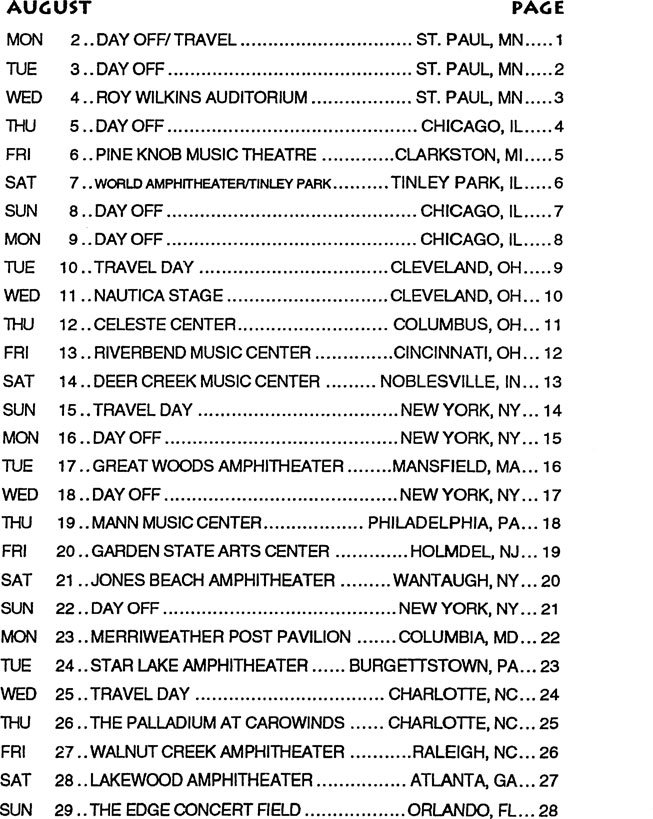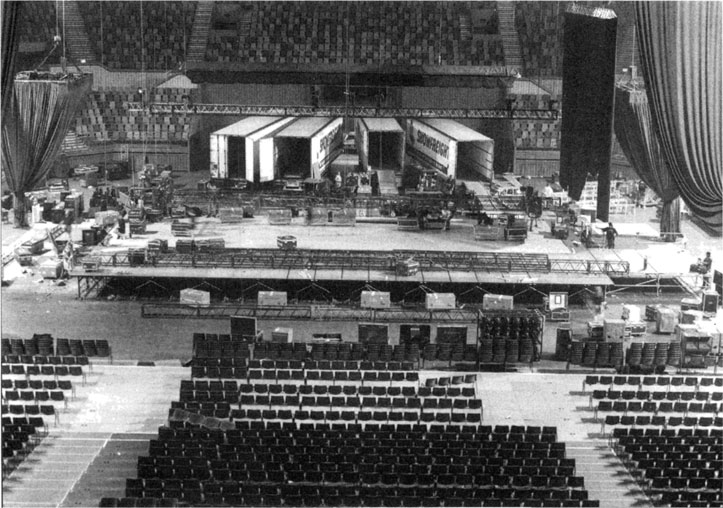INTRODUCTION TO THE TOURING CONCERT
A touring concert usually is conducted to perform and promote a recording artist’s new material and often coincides with the release of a new compact disc (CD). Some artists like to perform whether or not they have a product to sell; they like the adulation of the audience and the satisfaction of their performance. The areas selected for touring depend on the amount of money offered by the promoters. The amount that a promoter offers depends on the popularity of the artist in the region. This popularity is gauged by the artist’s previous accomplishments and current record sales in the region. The agent books the dates with the promoters and often proposes a tour that does not follow any sort of geographic logic. Once a realistic tour is booked and the deals are defined (Figure 1–1), a budget can be set for production. The size and type of venues, the guaranteed fee, and the distance between venues determine the scale of production.
Figure 1–1. Schedule from a recent itinerary.
The volume of equipment depends primarily on budget, followed by the artistic requirements of the artist’s management, and then of the stars themselves. Unlike theatrical productions in which a producer and a director call the shots, a concert tour is run by the tour manager and the production manager under the direction of the performer’s management. Each performer is unique when it comes to touring; they all have their idiosyncrasies.
A band has a manager or manages itself. The manager makes the business decisions regarding record deals, performance fees, media exposure, and legal matters. The manager employs an agent to book shows. The agent works for a commission and usually strives to book to the highest-bidding promoter. The manager has to make sure that the costs of traveling to the shows and providing production do not swallow up the fee, but often this is the case. The manager works with the production manager to schedule shows and to contain production costs in line with fee revenue.
The promoter is the entrepreneur who has a feel for the music business and can see an opportunity to make money selling tickets. The promoter makes an offer to the agent for an artist, and often the agent takes bids from several promoters. Competition among promoters goes a lot farther than the amount of money offered. It comes down to experience, history with the artist, and capability to promote through local radio, television, print media, and street posters. Promoters are selling a moment of time. They have the capability to persuade the ticket-buying public that this is the show it has to see.
The performers are the stars of the show. The performers may include a “star,” the band, the dancers, and a support act. The performers perform the show, talk to the media, and encourage people to buy their CDs, concert tickets, and merchandising items.
The tour manager oversees travel arrangements, collects money, pays the bills, and deals with problems as they arise.
The production manager administers and arranges the technical requirements and staff for the show. These requirements are documented in a contract rider, which is part of the performance contract. The production manager has to have an overview of the entire production to coordinate the touring and local production staff. The very nature of this position requires someone who is unruffled by whatever unexpected situation may arise. A logical mind that can prioritize problems is essential to maintain calm and effective management. The production manager has to be cautious not to exercise too much control and remove the initiative of the production team. The production manager encourages the members of the team to contribute ideas to solve problems and makes it clear that he or she is not there to think for the team. The production manager is the head of all production departments and provides financial and strategic guidance to those departments.
The stage manager is responsible for allocating the stagehands to the production crew for setup and load out. The stage manager also controls the movement of people and equipment on the stage, which includes cuing venue staff for houselights.
The sound engineer operates the front of house (FOH) console, which controls the sound that the audience hears. The sound engineer places the console in an optimum position for the control of the sound system. Often a specific location is reserved for the mixing consoles. This position varies with most venues, but a general position is 90 to 110 feet from the front of the stage.
The monitor engineer operates the monitor console, which controls the sound that the performers hear onstage. The monitor console is positioned at the side of the stage such that gives the engineer a clear line of sight to each performer. The performers rely on the monitor engineer to give each performer the information he or she needs to stay in time and in tune.
The sound crew works with the sound engineer and monitor engineer to set up and maintain the sound system under the direction of the sound engineer and monitor engineer.
The lighting operator operates the control console for the lighting system. The lighting operator may also be the lighting designer, who formulates the overall look of the show and selects type, position, and color of the lighting instruments.
The lighting crew sets up, focuses, and maintains the lighting system. When moving lights are used, it is common for specific technicians to handle these instruments. The lighting crew may also be called on to operate curtains, follow spots, smoke machines, or chain hoists during the performance.
The backline crew is responsible for performers’ instruments and equipment, such as guitars, drums, keyboards, and other instruments. The backline crew has the closest relationship with the performers because they maintain their instruments and make the necessary changes during a show.
The size of the production may call for set carpenters, who are responsible for risers, flooring, set pieces, curtains, scrims, and props. The set carpenters are the jacks of all trades who build the foundation of the performance space.
Truck drivers start work when the show is loaded and finish when they reach the next venue and unload. The crew bus drivers deliver the crew, while they sleep, safely to the next venue.
Some productions may include wardrobe staff, hairdressers, pyrotechnicians, riggers, security personnel, caterers, laser technicians, video crews, and production assistants. A touring entourage can be as small as performers with one crew or expand to include a tour accountant, spouses, children, nannies, massage therapists, personal trainers, publicists, photographers, and other ancillary personnel.
In addition to the touring party, a large local staff is required for a show.
The promoter buys the show from the booking agent and sells the tickets for the show. The promoter also ensures that the requirements set out in the contract rider are met. Sometimes when a promoter plans several shows in different cities, a local representative is employed. The local representative may be sold part or all of the show and take part or all of the risk or profits.
The promoter’s production manager arranges equipment and staff as required in the contract rider.
Loaders unload and reload the trucks (Figure 1–2). They may be union staff with strict breaks and penalty rates if the breaks are not taken within the union guidelines.
Figure 1–2. Performance area during load in.
The stagehands move equipment into position and assist the touring crew with setup and load out. In some parts of the world, there is no distinction between unloading a truck and loading its contents onto the stage. Stagehands may be union staff with strict guidelines.
Riggers attach the chain motors used to lift speakers and lighting trusses to the beams of the building. Riggers may be divided into climbing riggers and ground riggers. When a venue has no suitable rigging points, a ground support system is used for lighting, and the speaker system is stacked on risers or directly onto the stage.
The electrician connects the power cables for the sound and lighting equipment to the electrical supply of the venue. Other services may be required depending on the production.
Runners work under the direction of the production manager; they provide the link to the outside world. Runners are sent out for whatever is required.
The spotlight operators are required only at show time to operate follow spots, unless there is a specific reason otherwise.
The house light operator controls the venue lighting under the direction of the stage manager.
When a forklift is required, a licensed driver also is required.
The backstage caterers meet the requirements of the contract rider and make sure that the performers and crew are well fed.
The venue staff depends on the size of the audience. The venue staff consists of ticket collectors, ushers, parking attendants, merchandising vendors, and security staff.
Established performers have a production team that has evolved with them through their careers. The lighting designer and sound engineer are carefully selected by an artist because they are the ones who control the look and sound of the show. In larger productions there may be a set designer, a lighting designer, lighting console operator, and moving light operator. This team works together for the overall look of the performance. The designers get their ideas on paper and made real by the production companies. Once a show is programmed and ready for the road, the designers leave the daily running of the show to the console operators.


